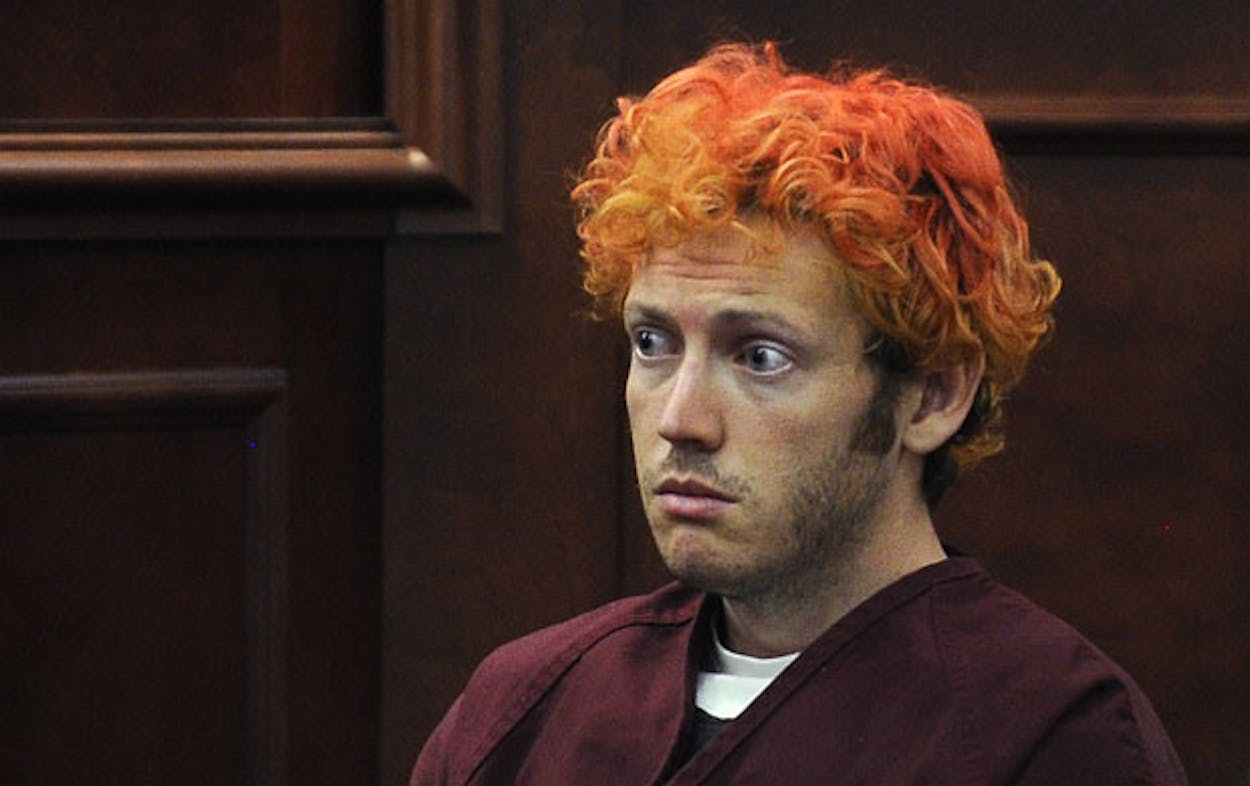The maroon prison clothing only serves to make this creepier: Back when he was still a promising neuroscience student rather than an accused mass murderer, Aurora, Colorado, Dark Knight shooting suspect James Holmes had Texas A&M among his graduate school choices—and A&M was interested.
The university released Holmes’ application and accompanying documents in response to an open records request from the Denver Post.
As the Post‘s Jeremy P. Meyer, Jessica Fender, and Chuck Murphy reported, Holmes, who had a 3.95 GPA as an undergraduate at University of California-Riverside, filed his application to A&M in early 2011, but he had a change of heart shortly before he was to visit College Station. He ended up enrolling at the University of Colorado at Denver.
As Meyer, Fender and Murphy wrote:
Holmes had impressed a number of interviewers, becoming one of eight candidates who were invited for on-campus interviews…
“The committee was very impressed with your application and would like to invite you for a visit,” said Jim Grau, chair of the Texas A&M Institute for Neuroscience in an e-mail to Holmes. “Our recruiting day is scheduled for Monday, March 7th. There will be a reception on the evening of March 6th, followed by tours and interview the next day. You will be free to depart Monday evening or the following morning. We will be arranging your hotel accommodations.”
Three of the four faculty members who reviewed Holmes’ packet rated him very highly — nines and 10s on a 10-point scale — and thought him a good candidate for admission. One rated Holmes as a “maybe,” but wanted to bring him in for an interview.
Cindy George of the Houston Chronicle further noted that Holmes received his invitation on Valentine’s Day. He responded he’d be coming just three hours later, and “also inquired about a shuttle from Houston’s Hobby Airport to College Station.” But, George continued:
On March 1, 2011, Holmes sent an email to university officials declining to move forward with his application.
“I will be pursuing other interests and won’t be coming for a visit,” he wrote.
When informed, professor Ursula Winzer-Serhan replied in an email: “Too bad. We should have acted on him sooner.”
A&M spokeswoman Sherylon Carroll told George the university would have no further comment.
Much of the material, including Holmes’ essay, undergraduate transcripts and letters of recommendation, have been released by other schools. Two of them where Holmes had been evaluated further in the admissions process looked at him more skeptically (as the A&M admitters might have had they met him face-to-face).
In late August, Meyer and Murphy reported that the University of Iowa had rejected Holmes. “Do NOT offer admission under any circumstances,” one member of Iowa’s admissions committee wrote.
And while faculty members at the University of Alabama-Birmingham were split on Holmes as a prospective student, they ultimately chose not to offer him admission. “He may be extremely smart, but difficult to engage,” one reviewer said of Holmes, as Eric Roberts of the UAB Kaleidoscope reported.
Many news outlets have suggested that Holmes’ lawyers will attempt to mount an insanity defense. If so, as Will C. Holden of KDVR speculated, the graduate school materials could end up being cited by both the prosecution and defense as evidence into his overall state of mind.
But the most potentially revealing portion, the so-called personal essay, is generic and not really all that personal, though many news outlets have highlighted the portion where Holmes wrote that “rational people act based on incentives for self-fulfillment, including fulfilling needs of self-development and needs of feeling useful and helpful to others.”
Holmes is due back in a Colorado court on Thursday. He is facing 24 counts of first degree murder and 116 counts of attempted murder.
Below, the full file of Holmes’ A&M admissions application and related documents.







